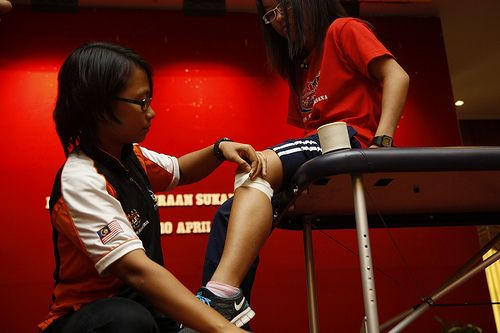Overuse Injuries Most Common In Kids Who Play 1 Sport; Doctors Push For More Unstructured Play

Kids who participate in a single sport rather than unstructured free play are more likely to develop an overuse injury, particularly if they spend more than twice the number of hours in that sport, researchers now argue.
Presented Monday at the American Academy of Pediatrics (AAP) National Conference and Exhibition, the findings point to the overwhelming number of hours child and adolescent athletes spend devoted to their sport in a given year. Sports such as soccer and hockey can be played in some variation year-round, a greater time commitment than many professional athletes donate, and an even greater physical tax on child athletes’ still growing bodies.
"We looked at how much organized sports kids were playing compared to how much they played for fun," said lead study author Dr. Neeru Jayanthi, medical director of primary-care sports medicine at Loyola University Health System, to HealthDay. "When that ratio got above 1.9 to 1, the risk of injury went up."
Jayanthi and his team said kids shouldn’t compete in rigorous sport-related activities more hours each week than years in their age. In other words, 10-year-olds should limit themselves to 10 hours of weekly physical activity, including both structured sports and loose playtime. Jayanthi and his team collected data on more than 1,200 kids aged 8 to 18 as they entered one of two Chicago hospitals to treat an injury or receive a physical. Roughly two-thirds were injured, and just over half were boys.
Athletes who engaged in a single sport tended to have more injuries even after the team factored in the subjects’ ages and greater hours engaged in weekly physical activity.
Specialization consisted of several criteria on a six-point scale. Researchers evaluated if the athlete: trains to improve skill, misses time with friends, has quit other sports to concentrate on the one, considers one sport more important than another, regularly travels out of state, trains 75 percent of the time or more on one sport, and whether the athlete trains more than eight months out of the year or competes more than six months out of the year.
Dr. Dennis Cardone, chief of primary-care sports medicine at NYU Langone Medical Center, said sports specialization is tantalizing for young athletes and parents alike. Finding one sport early on and sticking to it acclimates children to the sport’s demands and allows for a longer timeline that may one day lead to high school, collegiate, or even professional competition.
Cardone, however, remained cautious in these expectations.
"The likelihood that any child is going to be the next Serena Williams is small," Cardone said. "And specializing too early may cause harm. Physically and emotionally, there are consequences."
Typically, Cardone added, these specializations are initiated by the parents, who see their child swing a bat or grip a football at an early age and rush to cultivate a talent, with the risk of injury relegated to the back burner. The solution, as Cardone sees it, is to introduce kids to the sport early on, but only begin to specialize later on in life.
"In today's world, specialization may be necessary if you want to get a college scholarship, but don't start specializing until mid-adolescence or later," he said. "Early introduction to sports is fine, but don't specialize until later."
Both Cardone and Jayanthi agreed that unstructured play time is critical to kids staying injury-free while still maintaining an active lifestyle. "Even professional athletes don't compete all year," Jayanthi said, highlighting that too often kids are subjected to super-professional standards — ones they may begin to internalize in unhealthy ways to cope with the extreme pressure.
"Growing up, most people who are parents now went out to the park with their friends and played multiple sports throughout the year," Cardone said, suggesting that unstructured activity doesn’t need a season’s end to know when they’re finished playing. "Without a coach or parents telling them what to do, kids will stop when they want to."
Published by Medicaldaily.com



























